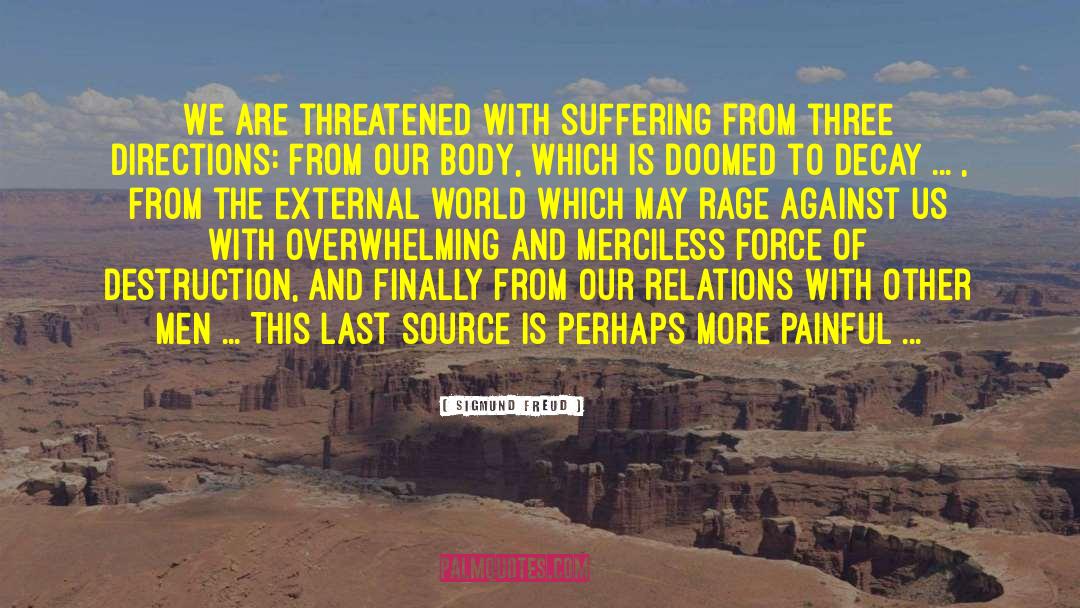Quotes About Posttraumatic
Enjoy collection of 37 Posttraumatic quotes. Download and share images of famous quotes about Posttraumatic. Righ click to see and save pictures of Posttraumatic quotes that you can use as your wallpaper for free.
Instead of showing visibly distinct alternate identities, the typical DID patient presents a polysymptomatic mixture of dissociative and posttraumatic stressdisorder (PTSD) symptoms that are embedded in a matrix of ostensibly non-trauma-related symptoms (e.g., depression, panic attacks, substance abuse,somatoform symptoms, eating-disordered symptoms). The prominence of these latter, highly familiar symptoms often leads clinicians to diagnose only these comorbid conditions. When this happens, the undiagnosed DID patient may undergo a long and frequently unsuccessful treatment for these other conditions.
- Guidelines for Treating Dissociative Identity Disorder in Adults, Third Revision, p5 ~ James A. Chu
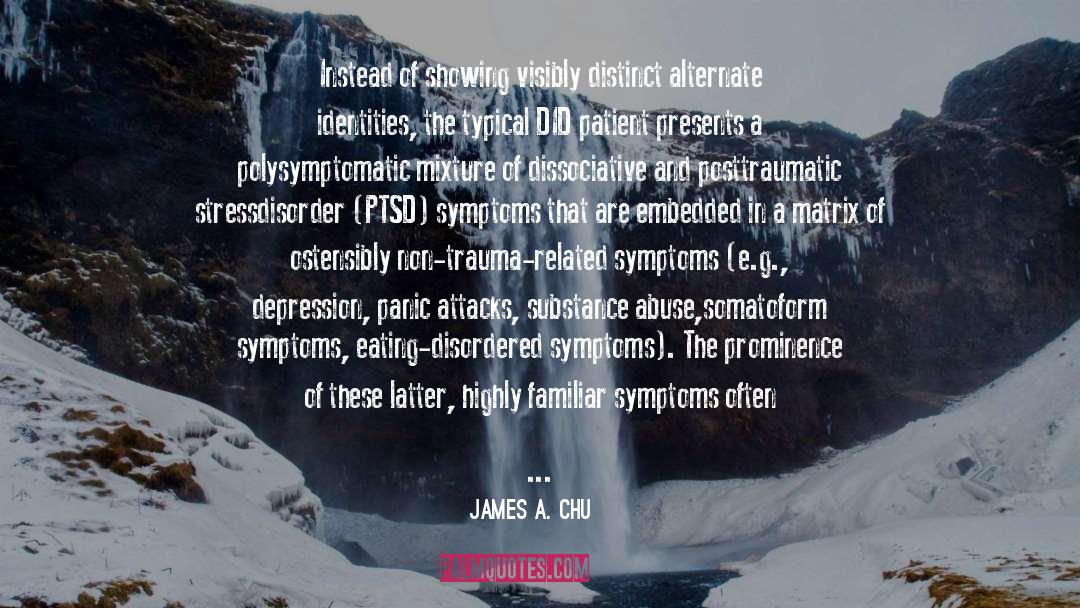
Posttraumatic stress is something that's always existed. I think that the earliest recording was during the Trojan War, but it's only recently that we're beginning to be aware of it. ~ Janine Di Giovanni
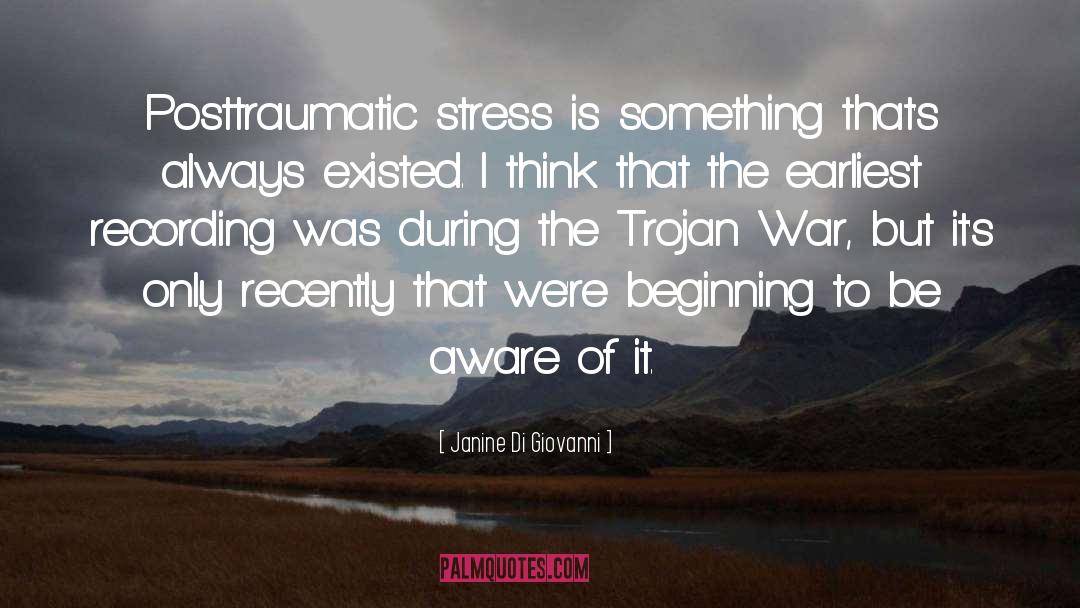
Our work calls on us to confront, with our patients and within ourselves, extraordinary human experiences. This confrontation is profoundly humbling in that at all times these experiences challenge the limits of our humanity and our view of the world... ~ John P. Wilson
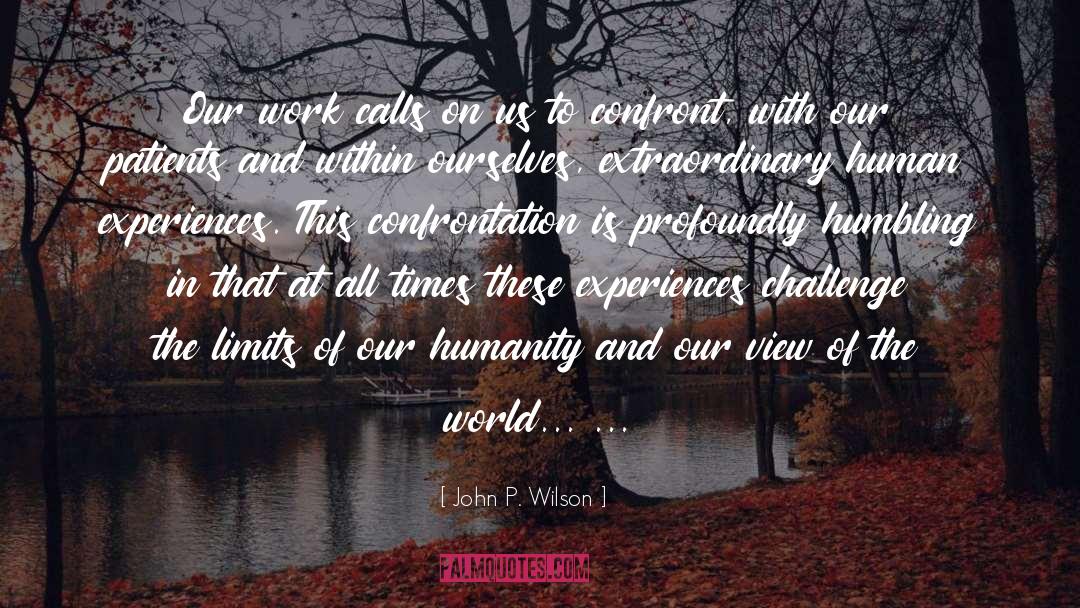
Posttraumatic stress disorder (PTSD) also has dissociative symptoms as an essential feature. PTSD has been classically seen as a biphasic disorder, with persons alternately experiencing phases of intrusion and numbing... [T]he intrusive phase is associated with recurrent and distressing recollections in thoughts or dreams and reliving the events in flashbacks. The avoidant/numbing phase is associated with efforts to avoid thoughts or feelings associated with the trauma, emotional constriction, and social withdrawal. This biphasic pattern is the result of dissociation; traumatic events are distanced and dissociated from usual conscious awareness in the numbing phase, only to return in the intrusive phase. ~ James A. Chu
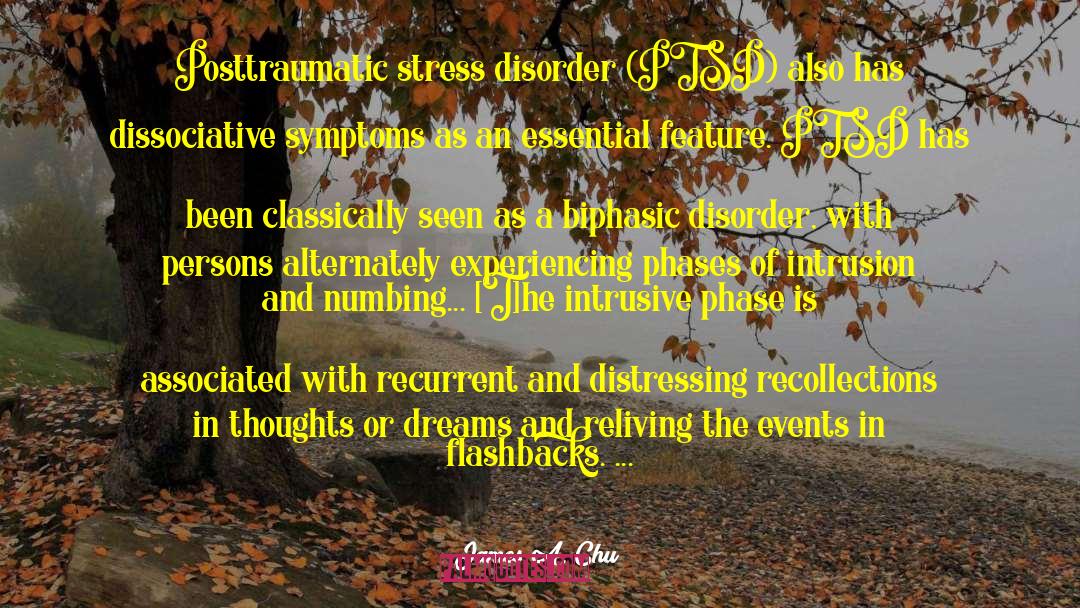
The second factor helping to bring the dissociative disorders back into the mainstream was the Vietnam War. For sociological reasons originating outside psychology and psychiatry, the Vietnam War and the posttraumatic stress disorder (PTSD) that arose from it were not forgotten when the veterans returned home, as had been the case in the two world wars and the Korean War. The realization that real, severe trauma could have serious long-term psychopathological consequences was forced on society as a whole by Vietnam. Once this principle was accepted, it as a short leap to the conclusion that severe childhood trauma might have serious sequelae lasting into adulthood. ~ Colin A. Ross
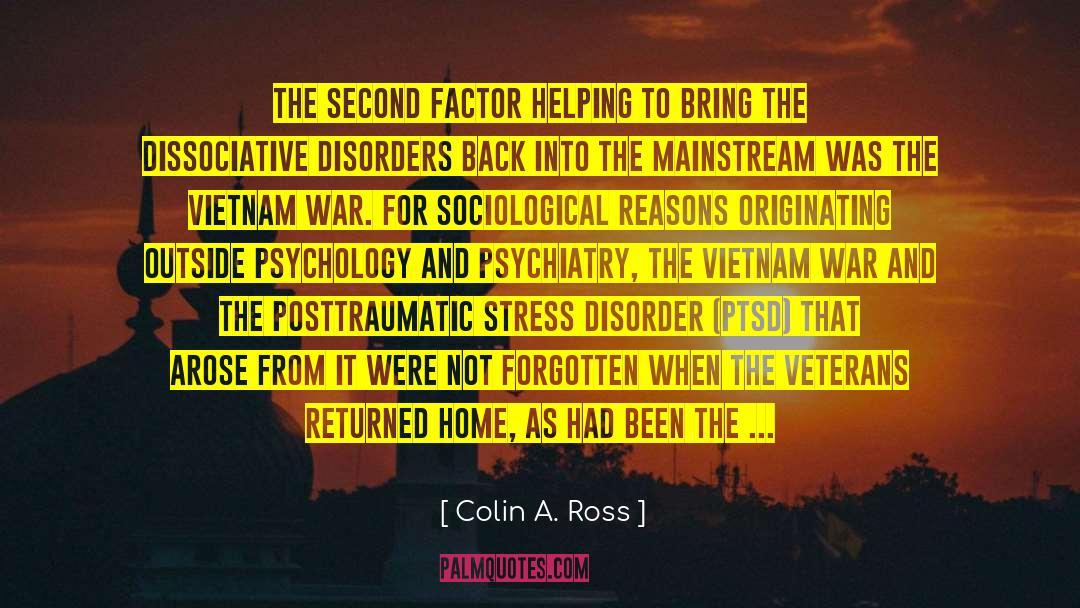
Often it isn't the initiating trauma that creates seemingly insurmountable pain, but the lack of support after. ~ S. Kelley Harrell
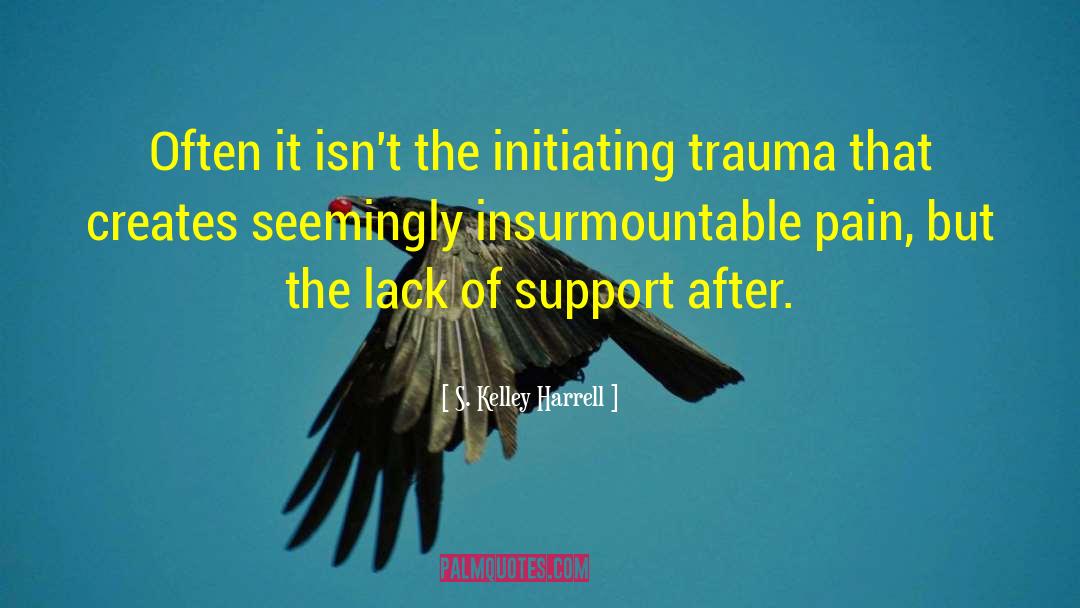
As connection to the therapist is established, the therapeutic relationship offers an opportunity for the client to experience a present attachment, but it also brings up transferential tendencies associated with past attach ment relationships (Sable, 2000). Informed by the experience of interperesonal trauma and betrayal, posttraumatic transferential relationships can be exceptionally potent and volatile. In response to the therapist, clients experience fear, anger, mistrust, and suspicion, as well as hope, vulnerability, and yearning, and they are acutely attuned to subtle signals of disinterest or interest, compassion or judgment, abandonment or consistency (Herman 1992; Pearlman & Saakvitne, 1995). ~ Pat Ogden
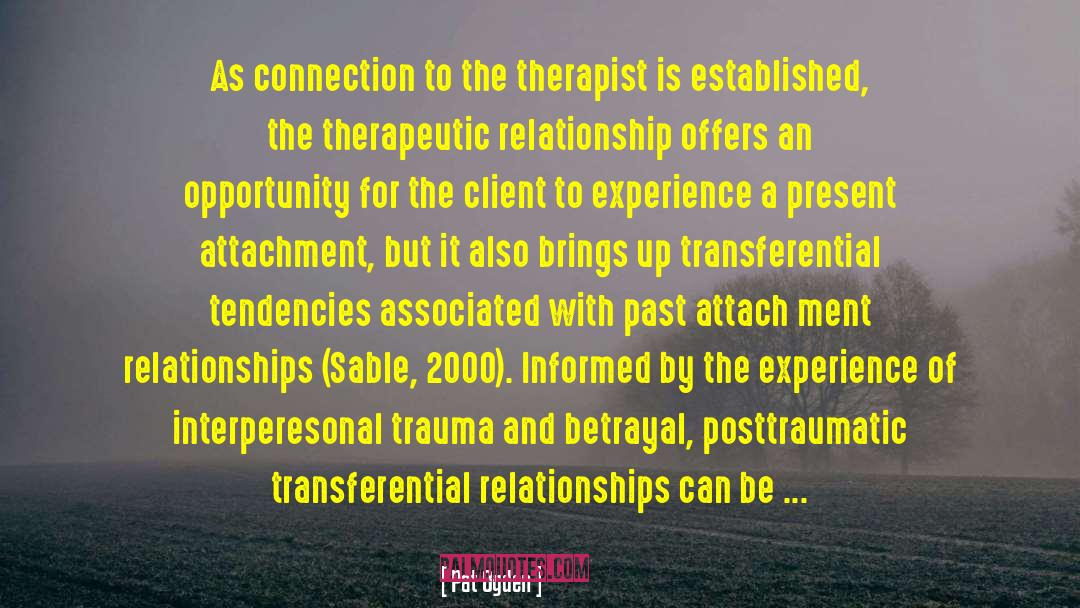
With regard to complex trauma survivors, self-determination and autonomy require that the therapist treat each client as the "authority" in determining the meaning and interpretation of his or her personal life history, including (but not limited to) traumatic experiences (Harvey, 1996). Therapists can inadvertently misappropriate the client's authority over the meaning and significance of her or his memories (and associated symptoms, such as intrusive reexperiencing or dissociative flashbacks) by suggesting specific "expert" interpretations of the memories or symptoms. Clients who feel profoundly abandoned by key caregivers may appear deeply grateful for such interpretations and pronouncements by their therapists, because they can fulfill a deep longing for a substitute parent who makes sense of the world or takes care of them. However, this delegation of authority to the therapist can backfire if the client cannot, or does not, take ownership of her or his own memories or life story by determining their personal meaning.Moreover, the client can be trapped in a stance of avoidance because trauma memories are never experienced, processed, and put to rest. Helping a client to develop a core sense of relational security and the capacity to regulate (and recover from) extreme hyper- or hypoarousal is essential if the client is to achieve a self-determined and autonomous approach to defining the meaning and impact of trauma memories, a crucial goal of posttraumatic therapy. ~ Christine A. Courtois
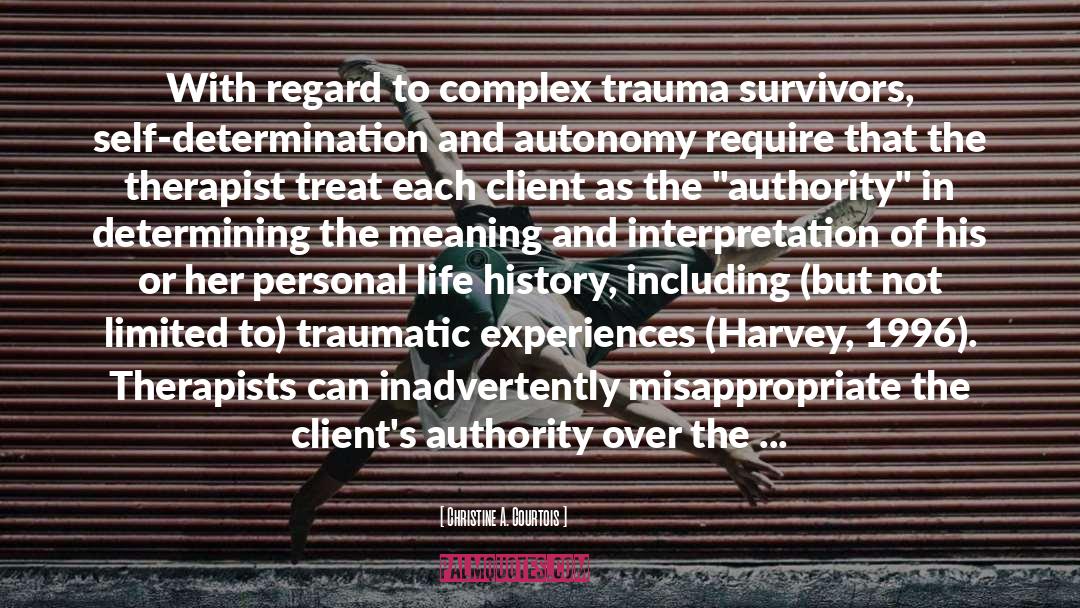
As you may already know, post-traumatic stress disorder is extremely complex. Each client has a unique, perhaps virtually unbelievable, set of experiences, and an almost equally set of reactions to those experiences. ~ Aphrodite Matsakis
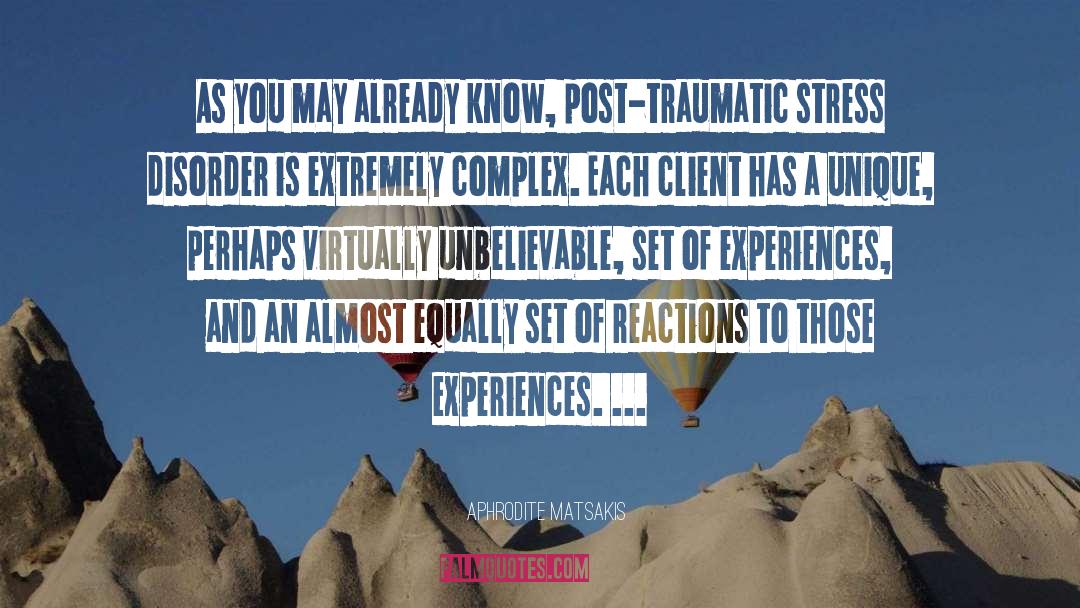
It is as though some old part of yourself wakes up in you, terrified, useless in the life you have, its skills and habits destructive but intact, and what is left of the present you, the person you have become, wilts and shrivels in sadness or despair: the person you have become is only a thin shell over this other, more electric and endangered self. The strongest, the least digested parts of your experience can rise up and put you back where you were when they occurred; all the rest of you stands back and weeps. ~ Peter Straub
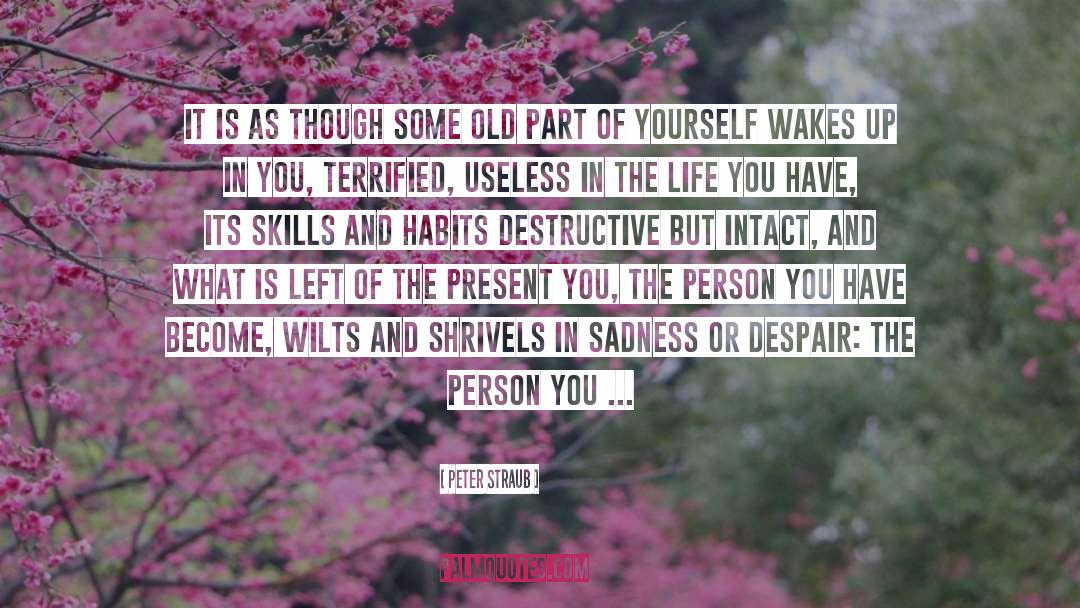
The most common emotional defense is avoidance (an ineffective coping skill for any stressor) as expressed through denial (e.g., "That wasn't really bad, I barely remember it"). ~ Brian Luke Seaward
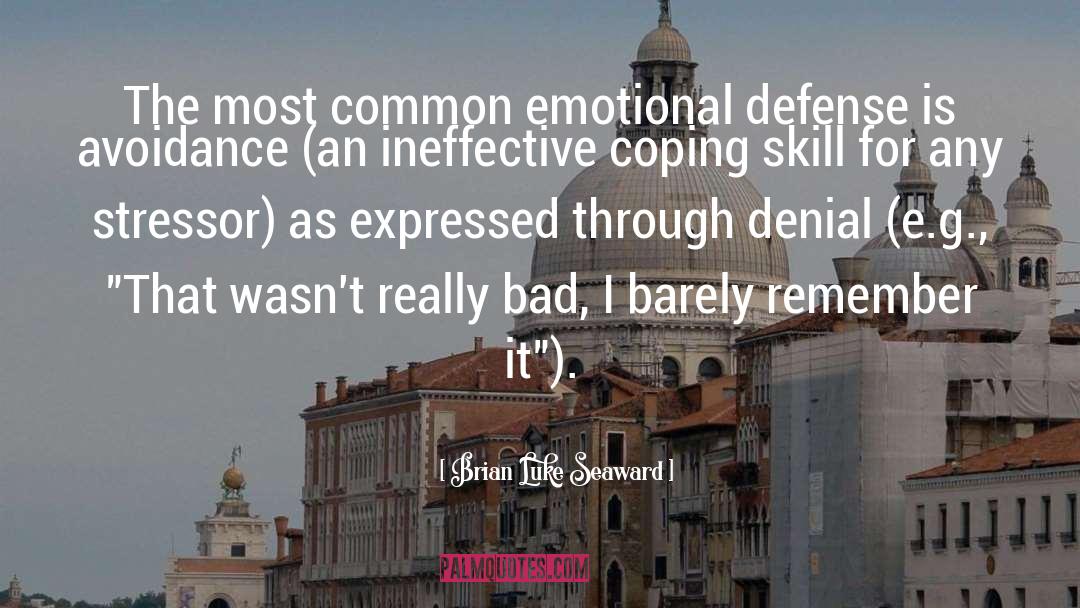
traumatic diagnoses such as post-traumatic stress disorder and dissociative identity disorder describe a shared array of human responses to degradation and dehumanization (Good & Hinton, 2016; Ross, 2011) ~ Michael Salter
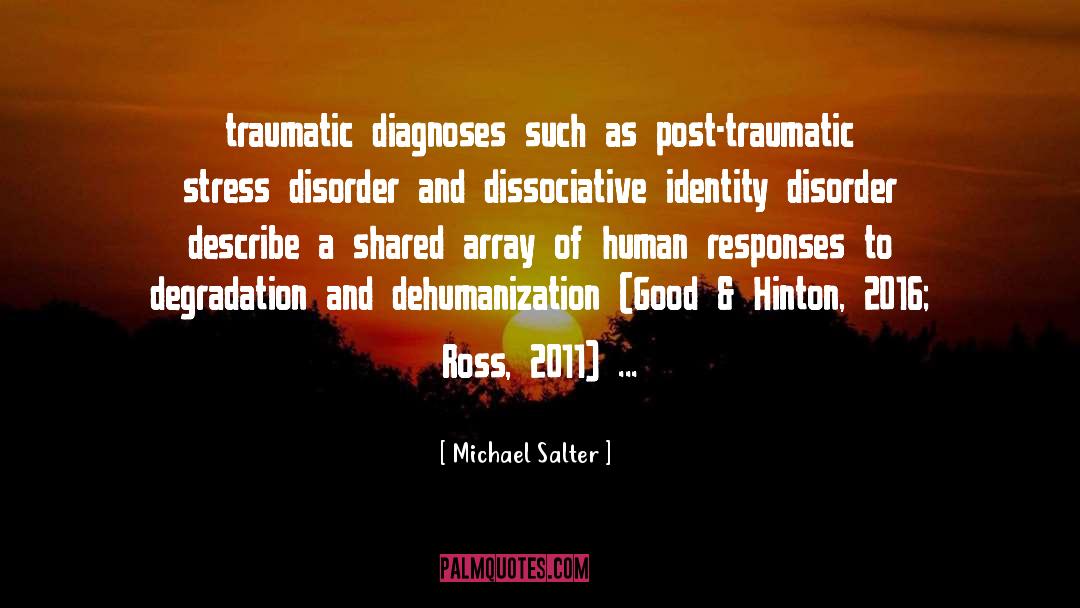
Unlike other forms of psychological disorders, the core issue in trauma is reality. ~ Bessel A. Van Der Kolk
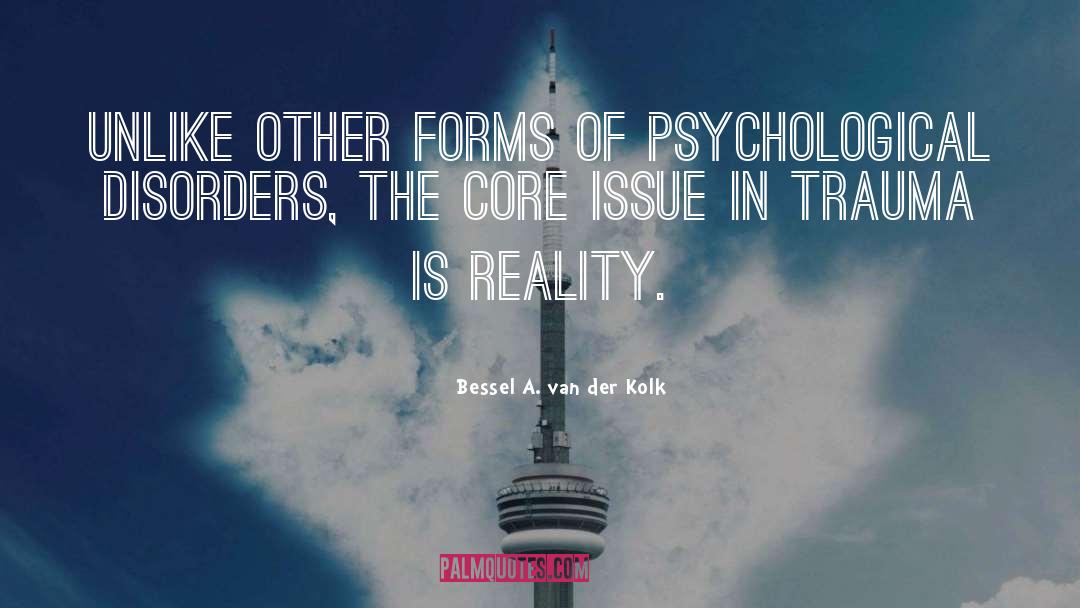
The brave men and women, who serve their country and as a result, live constantly with the war inside them, exist in a world of chaos. But the turmoil they experience isn't who they are; the PTSD invades their minds and bodies. ~ Robert Koger
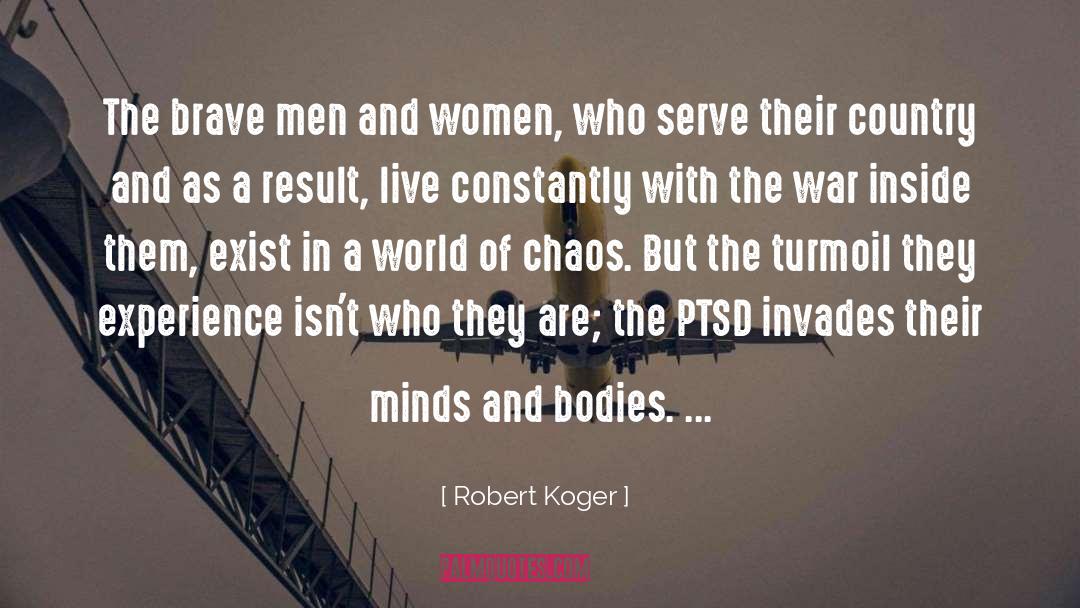
In World War One, they called it shell shock. Second time around, they called it battle fatigue. After 'Nam, it was post-traumatic stress disorder. ~ Jan Karon
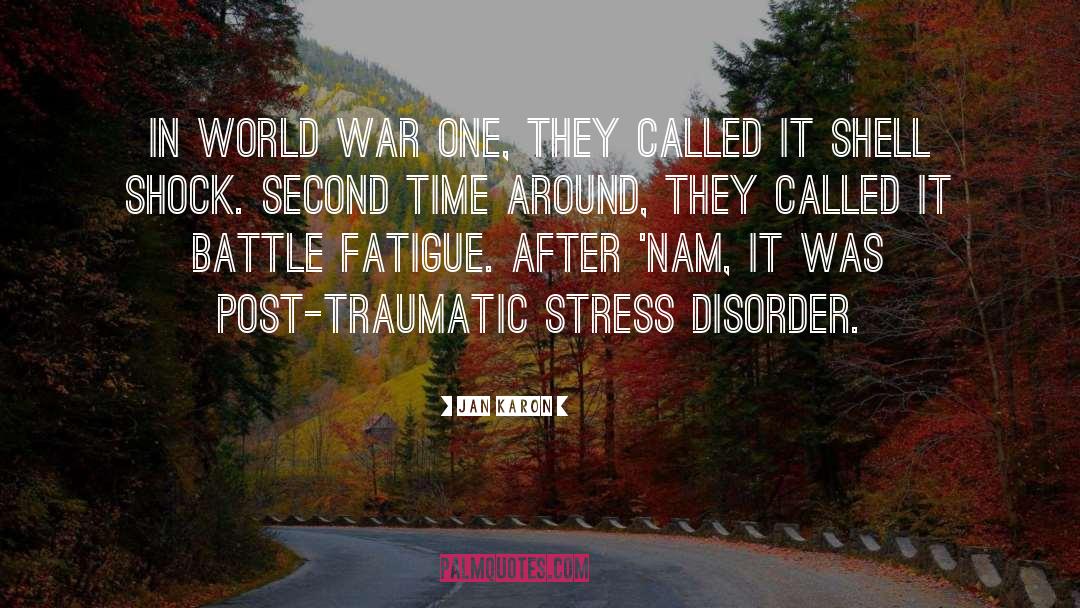
It is indeed the truth of the traumatic experience that forms the center of its psychopathology; it is not a pathology of falsehood or displacement of meaning, but of history itself (p. 5) ~ Cathy Caruth
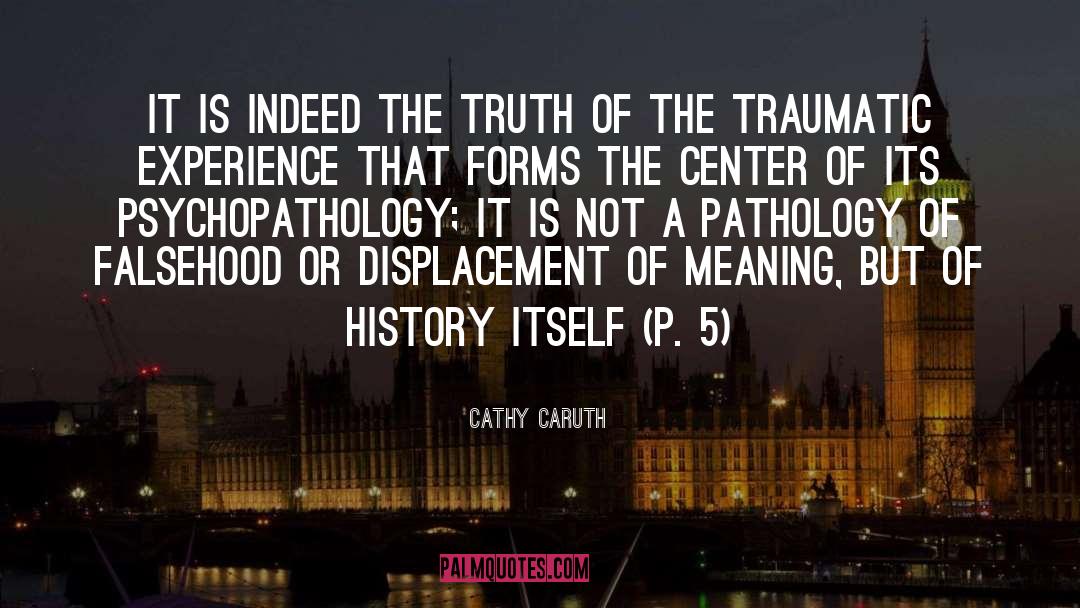
The power we discover inside ourselves as we survive a life-threatening experience can be utilized equally well outside of crisis, too. I am, in every moment, capable of mustering the strength to survive again - or of tapping that strength in other good, productive, healthy ways. ~ Michele Rosenthal
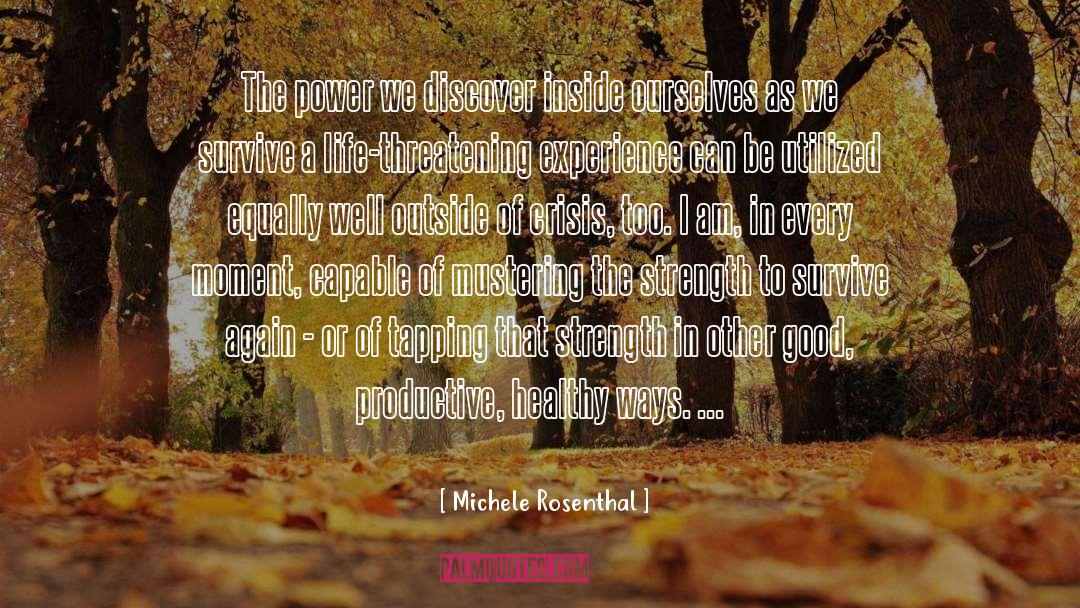
So, what role does memory play in the understanding and treatment of trauma? There is a form of implicit memory that is profoundly unconscious and forms the basis for the imprint trauma leaves on the body/mind. The type of memory utilized in learning most physical activities (walking, riding a bike, skiing, etc.) is a form of implicit memory called procedural memory. Procedural or "body memories" are learned sequences of coordinated "motor acts" chained together into meaningful actions. You may not remember explicitly how and when you learned them, but, at the appropriate moment, they are (implicitly) "recalled" and mobilized (acted out) simultaneously. These memories (action patterns) are formed and orchestrated largely by involuntary structures in the cerebellum and basal ganglia.
When a person is exposed to overwhelming stress, threat or injury, they develop a procedural memory. Trauma occurs when these implicit procedures are not neutralized. The failure to restore homeostasis is at the basis for the maladaptive and debilitating symptoms of trauma. ~ Peter A. Levine
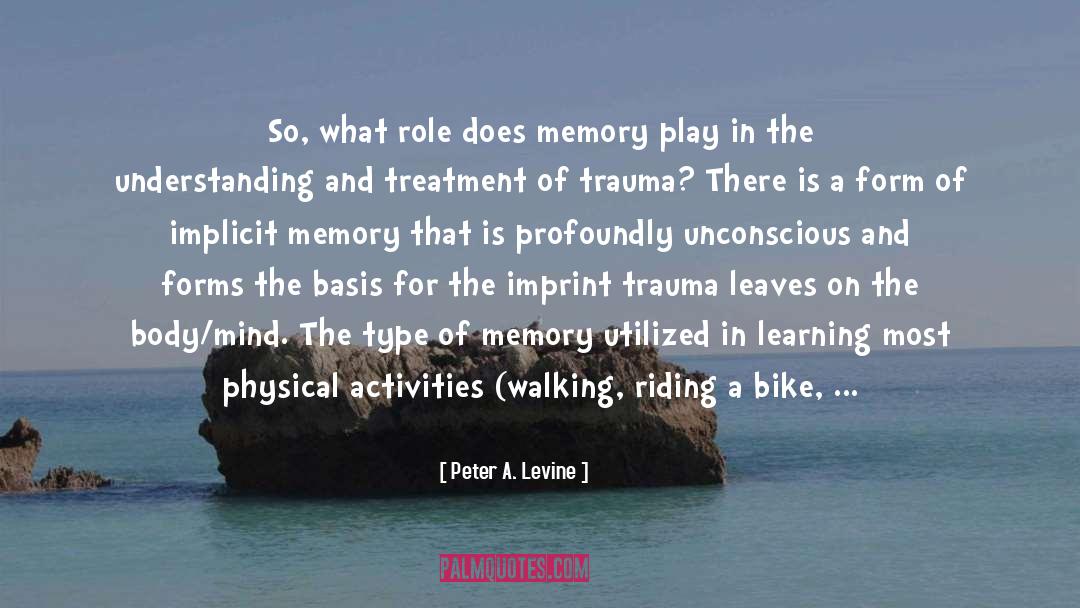
In order to believe clients' accounts of trauma, you need to suspend any pre-conceived notions that you have about what is possible and impossible in human experience. As simple as they may sound, it may be difficult to do so. ~ Aphrodite Matsakis
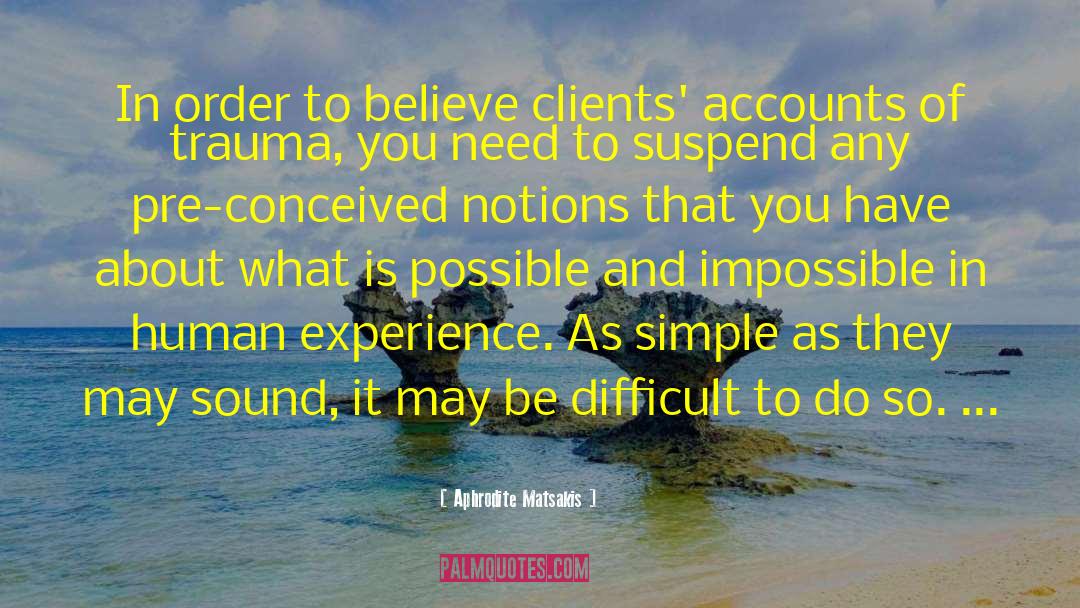
The prediction of false rape-related beliefs (rape myth acceptance [RMA]) was examined using the Illinois Rape Myth Acceptance Scale (Payne, Lonsway, & Fitzgerald, 1999) among a nonclinical sample of 258 male and female college students. Predictor variables included measures of attitudes toward women, gender role identity (GRI), sexual trauma history, and posttraumatic stress disorder (PTSD) symptom severity. Using linear regression and testing interaction effects, negative attitudes toward women significantly predicted greater RMA for individuals without a sexual trauma history.
However, neither attitudes toward women nor GRI were significant predictors of RMA for individuals with a sexual trauma history."
Rape Myth Acceptance, Sexual Trauma History, and Posttraumatic Stress Disorder
Shannon N. Baugher, PhD,
Jon D. Elhai, PhD,
James R. Monroe, PhD, Ruth Dakota, Matt J. Gray, PhD ~ Shannon N. Baugher
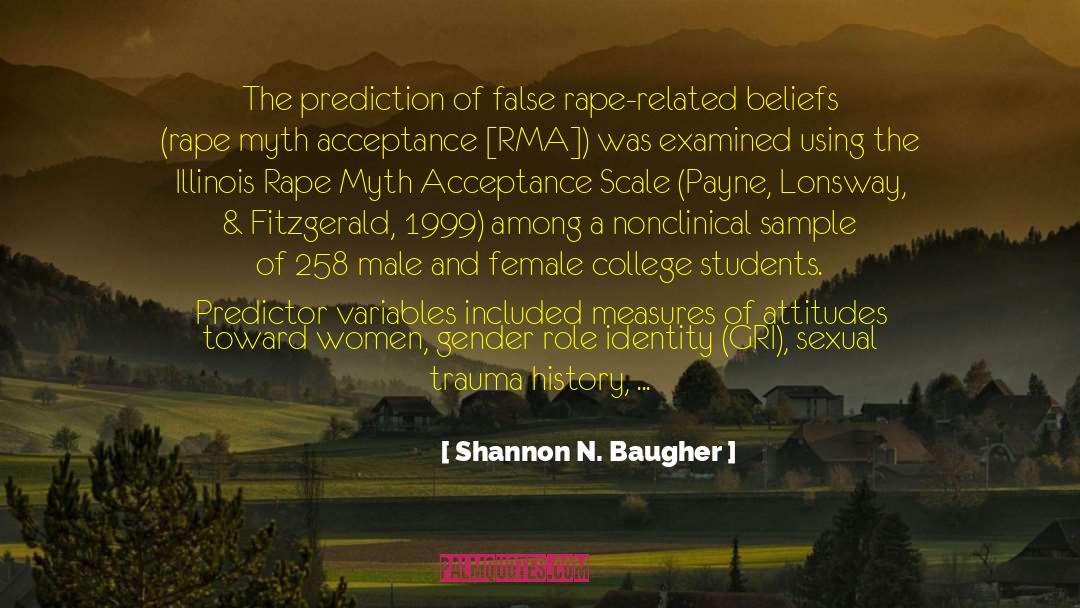
I became what I am today at the age of twelve, on a frigid overcast day in the winter of 1975. I remember the precise moment, crouching behind a crumbling mud wall, peeking into the alley near the frozen creek. That was a long time ago, but it's wrong what they say about the past, I've learned, about how you can bury it. Because the past claws its way out. Looking back now, I realize I have been peeking into that deserted alley for the last twenty-six years. ~ Khaled Hosseini
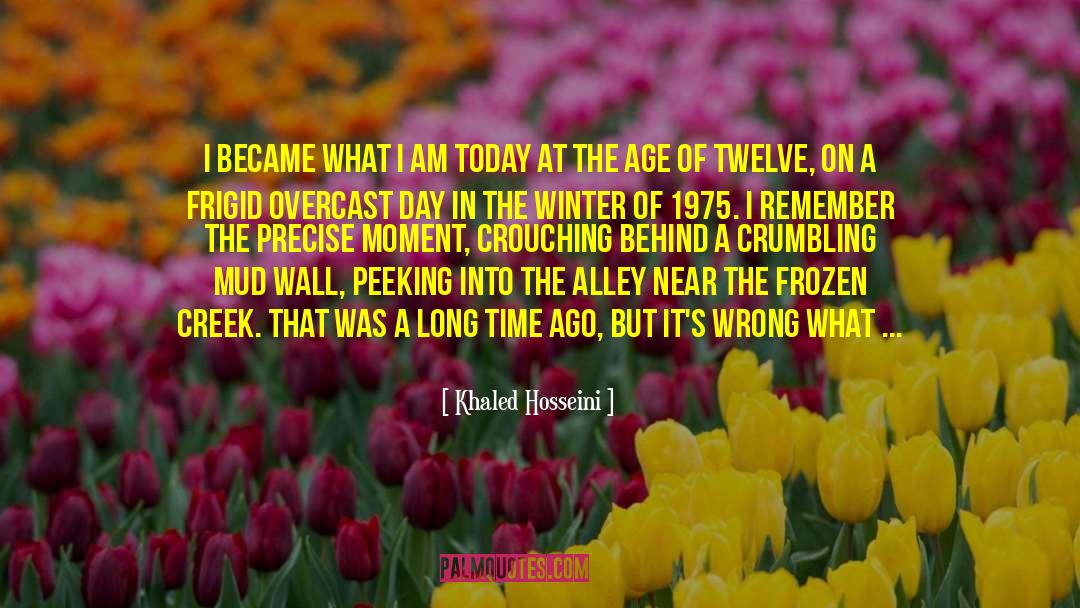
TRAUMA STEALS YOUR VOICE
People get so tired of asking you what's wrong and you've run out of nothings to tell them.
You've tried and they've tried, but the words just turn to ashes every time they try to leave your mouth.
They start as fire in the pit of your stomach, but come out in a puff of smoke.
You are not you anymore.
And you don't know how to fix this.
The worst part is...you don't even know how to try. ~ Nikitta Gill
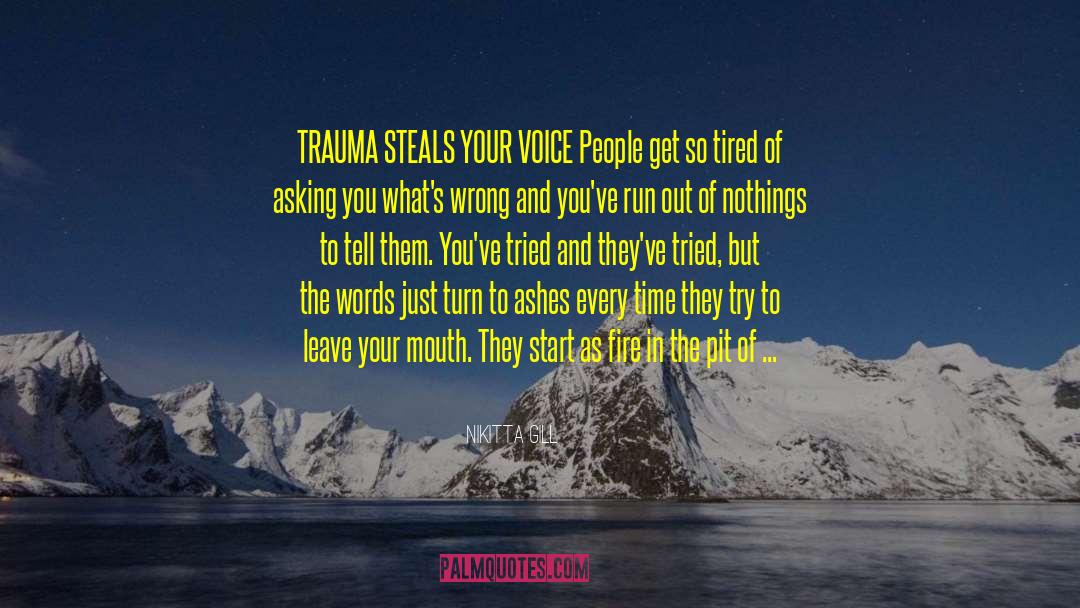
... as Herman (1992b) cogently noted two decades ago, these personality disorders can be iatrogenic, causing harm to individuals as an inadvertent result of the social stigma they carry and the widespread (but not entirely accurate) belief among professionals and insurers that those with Cluster B personality disorders (especially borderline personality disorder[BPD]) cannot be treated successfully, cannot recover, and are a headache to practitioners. For example, the BPD diagnosis continues to be applied predominantly to women often, but not always, in a negative way, usually signifying that they are irrational and beyond help. Describing posttraumatic symptoms as a personality disorder not only can be demoralizing for the client due to its connotation that something is defective with his or her core self (i.e., personality) but also may misdirect the therapist by implying that the patient's core personality should be the focus of treatment rather than trauma-related adaptations that affect but are distinct from the core self. In this way, both therapists and their clients may overlook personality strengths and capacities that are healthy and sources of resilience that can be a basis for building on and enhancing (rather than "fixing" or remaking) the patient's core self and personality. ~ Christine A. Courtois
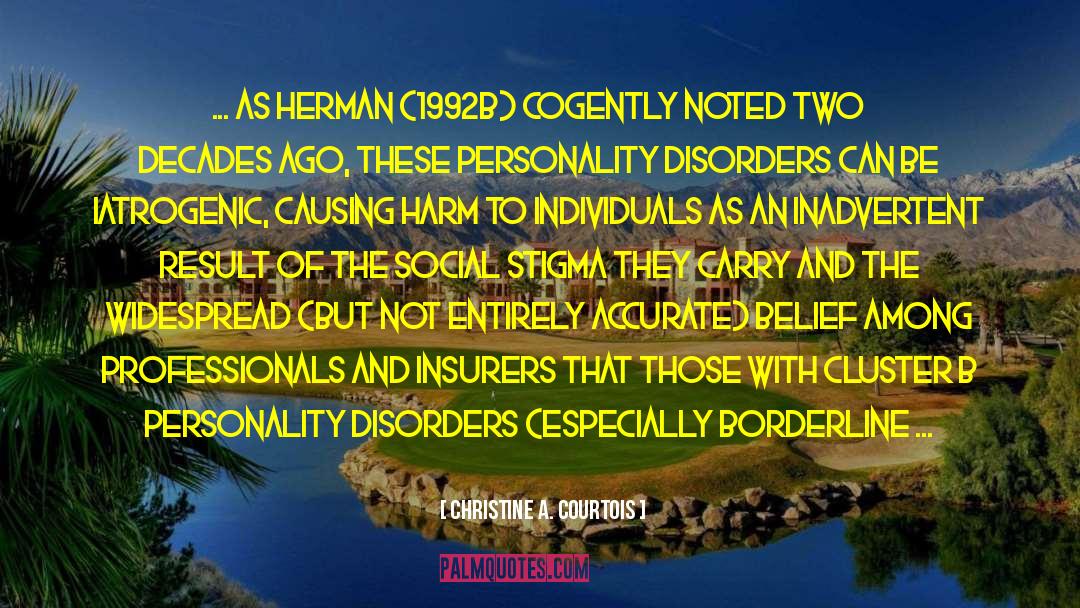
Always remember, if you have been diagnosed with PTSD, it is not a sign of weakness; rather, it is proof of your strength, because you have survived! ~ Michel Templet
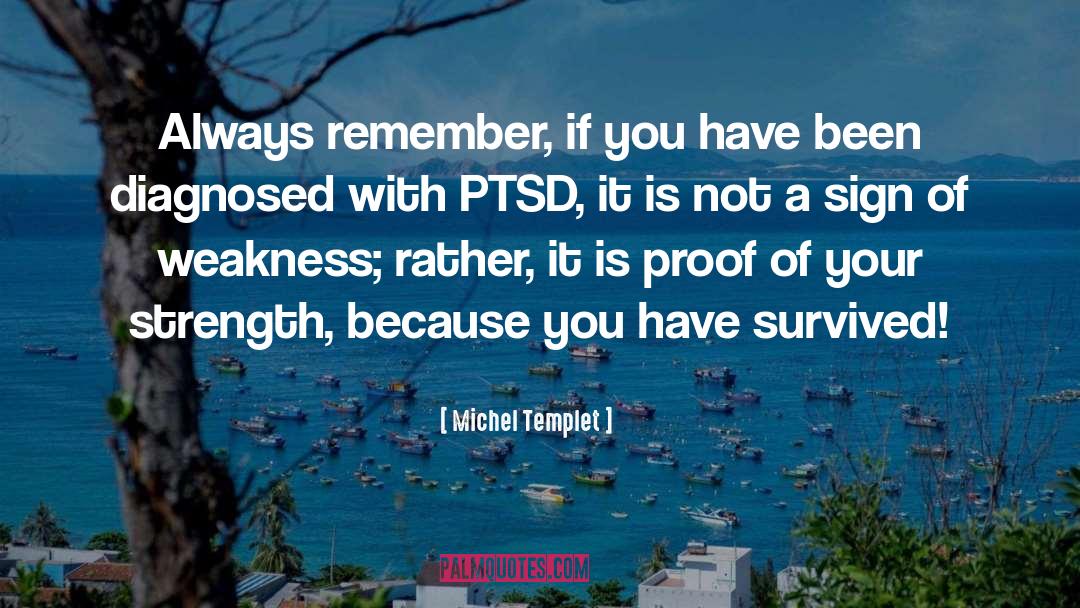
In the culture people talk about trauma as an event that happened a long time ago. But what trauma is, is the imprints that event has left on your mind and in your sensations... the discomfort you feel and the agitation you feel and the rage and the helplessness you feel right now. ~ Bessel A. Van Der Kolk
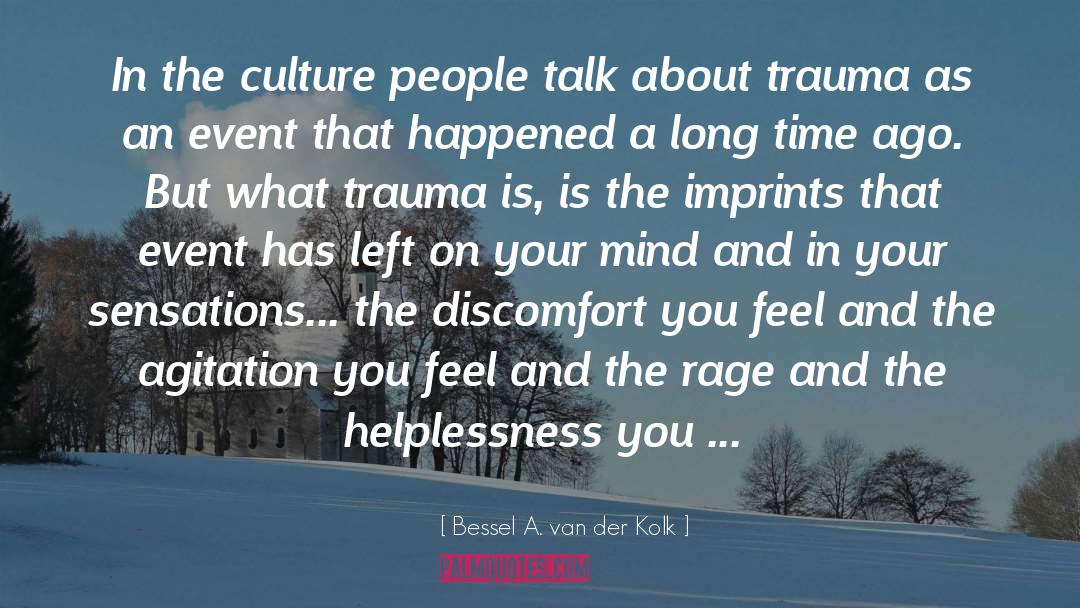
If you're working, it's the best therapy for posttraumatic stress, Juan says. Studies have shown that the gravity of posttraumatic stress is directly proportional to the length of time one lives with the threat of death, and Juan slowly unwinds the trauma of the sixty-nine days he lived inside a thundering mountain by going to work, fixing machines, then going back home, and then returning to work again. ~ Hector Tobar
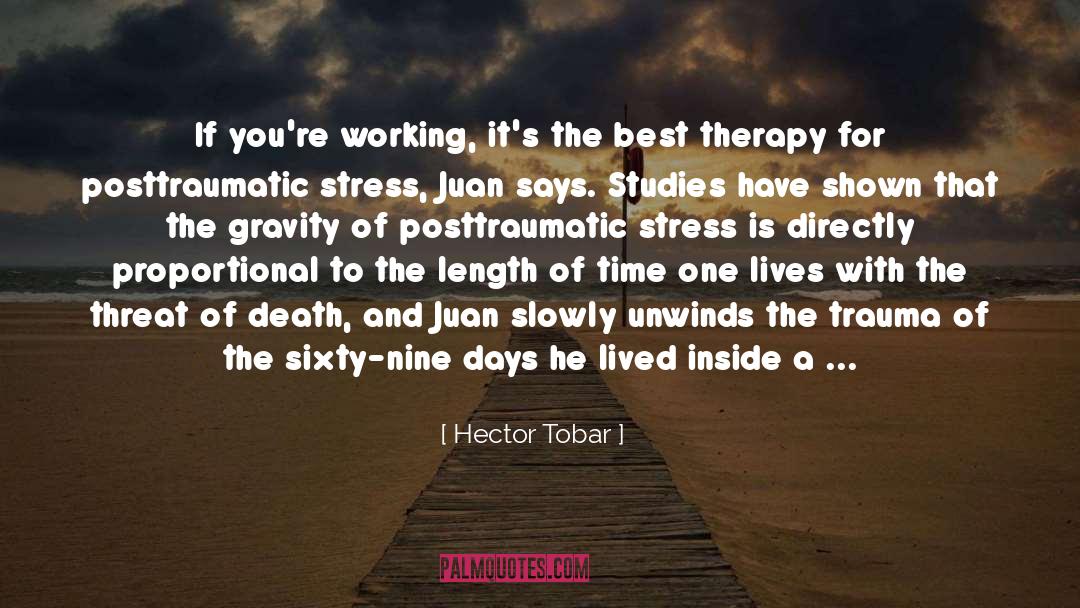
One of the most compelling sources on the validity of repressed memories of trauma has been the field of combat trauma. - Advances in Dissociation Research and practice in Israel ~ Eli Somer

Childhood trauma does not come in one single package. ~ Asa Don Brown
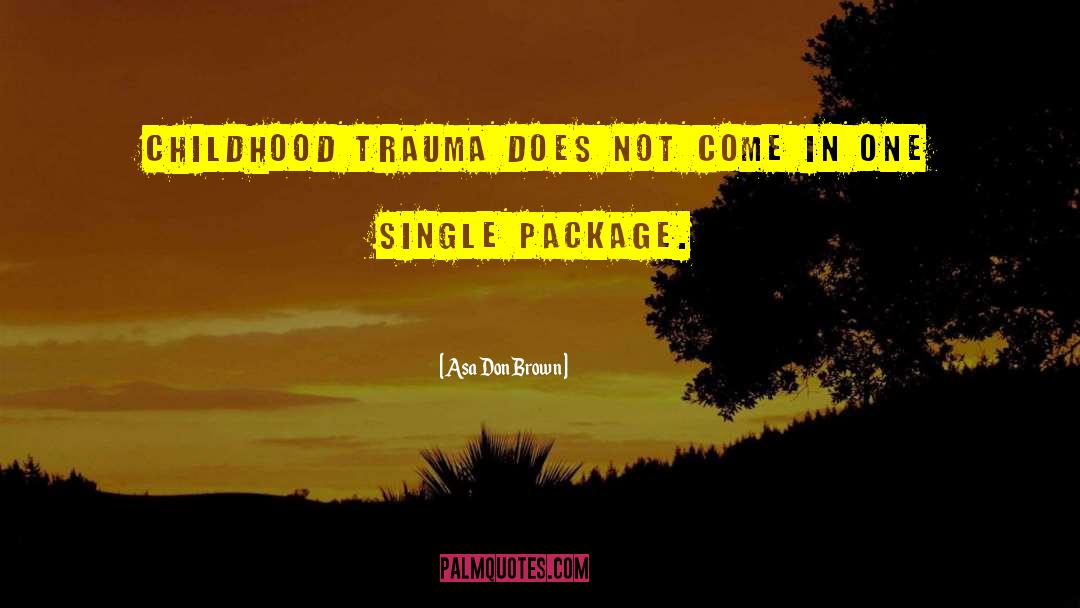
I went to a psychiatrist (NBC insisted we all go) and told her I had been through traumatic experiences before and understood that the kidnapping would leave "fingerprints" on me for a while. The key was knowing what to expect. If you get blind drunk, you know you're going to wake up with a hangover. By the same token, I expected post-traumatic stress symptoms - anger, irritability, a sense of isolation - and I experienced those feelings, off and on, for several months. It's like having the monkey on your back again, and being self-aware helps shake him off. ~ Richard Engel

As modern neurobiologists point out, the repetition of the traumatic experience in the flashbacks can be itself re-traumatizing; if not life-threatening, it is at least threatening to the chemical structure of the brain and can ultimately lead to deterioration. And this would also seem to explain the high suicide rate of survivor, for example, survivors of Vietnam. ~ Cathy Caruth
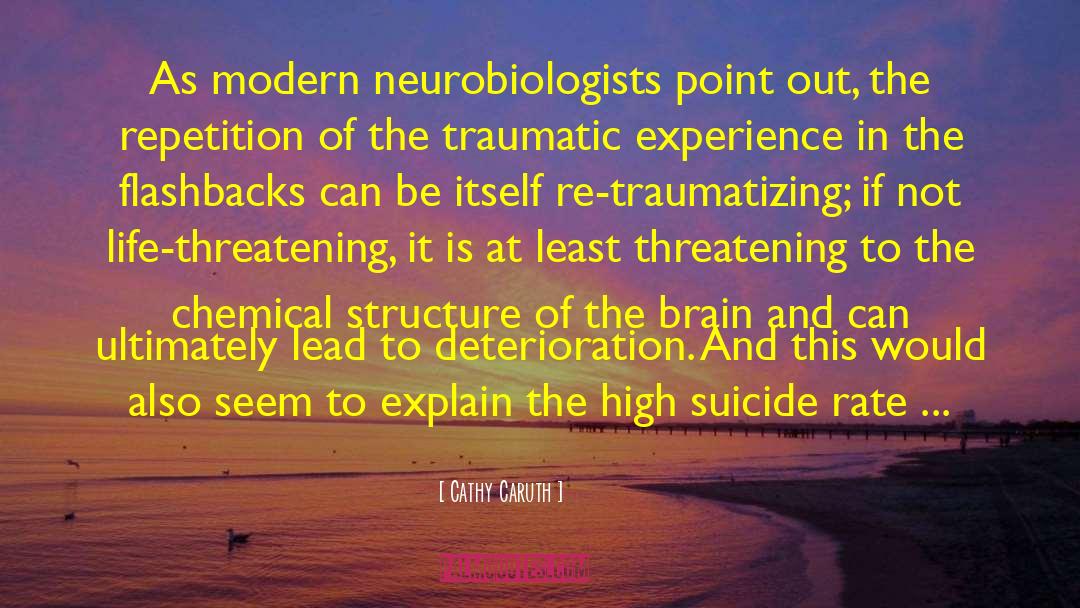
Because of media portrayals, clinicians may believe that dissociative identity disorder presents with dramatic, florid alternate identities with obvious state transitions (switching). These florid presentations occur in only about 5% of patients with dissociative identity disorder.(20) How ever, the vast majority of these patients have subtle presentations characterized by a mixture of dissociative and PTSD symptoms embedded with other symptoms, such as post-traumatic depression, substance abuse, somatoform symptoms, eating disorders, and self-destructive and impulsive behaviors.(2,10) ~ Bethany L. Brand
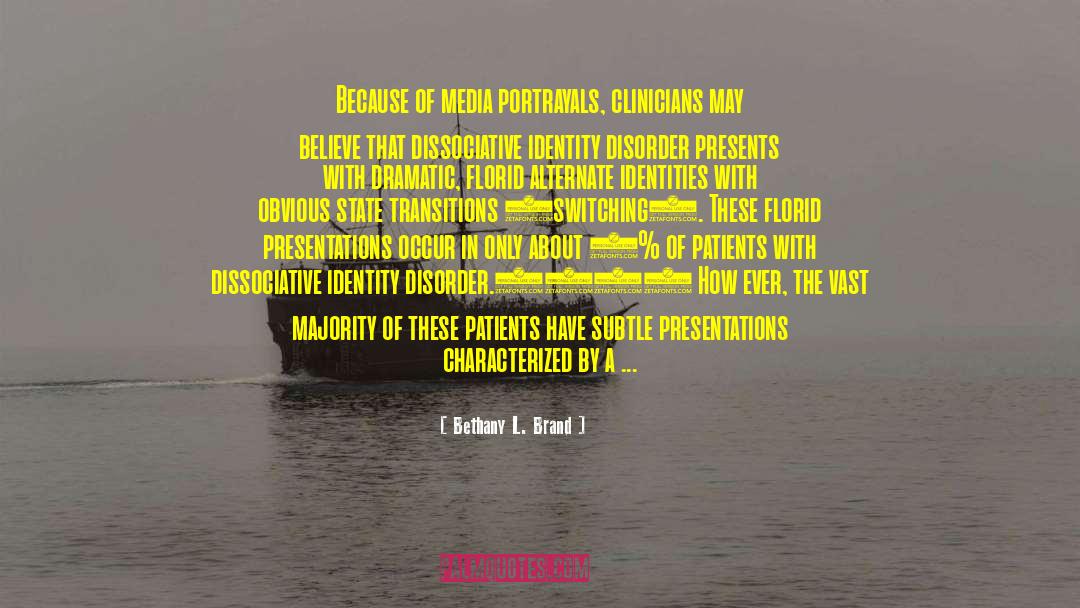
EMDR is a bizarre and wondrous treatment and anybody who first hears about it, myself included, thinks this is pretty hokey and strange. It's something invented by Francine Shapiro who found that, if you move your eyes from side to side as you think about distressing memories, that the memories lose their power.
And because of some experiences, both with myself, but even more with the patients of mine who told me about their experiences, I took a training in it. It turned out to be incredibly helpful. Then I did what's probably the largest NIH-funded study on EMDR. And we found that, of people with adult-onset traumas, a one-time trauma as an adult, that it had the best outcome of any treatment that has been published.
What's intriguing about EMDR is both how well it works and the question is how it works and that got me into this dream stuff that I talked about earlier, and how it does not work through figuring things out and understanding things. But it activates some natural processes in the brain that's helped you to integrate these past memories. ~ Bessel A. Van Der Kolk

Acknowledgement of the prevalence and impact of trauma challenges psychological theories that localize dysfunction within the individual while ignoring the contribution of social forces on adjustment (Brett, 1996; Ross, 2000). ~ Rachel E. Goldsmith
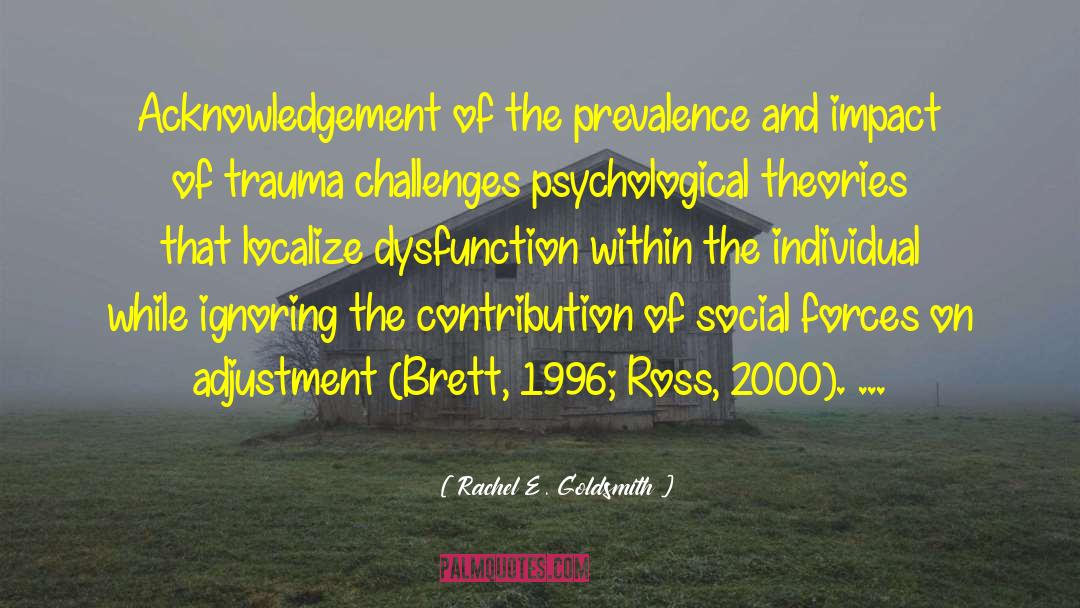
In talking with people that have experienced it, I learned that PTSD is something that a person in a position of authority sometimes thinks they're not supposed to have. They don't always have an avenue to personally address it or even discuss it. ~ Stana Katic
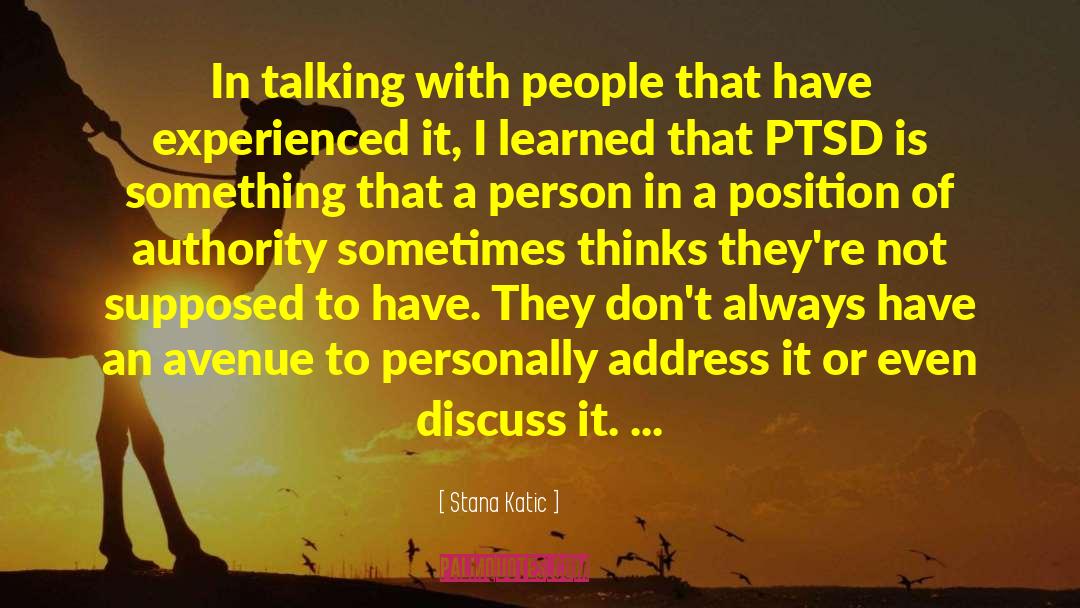
I have met many, many severely distressed people whose daily lives are filled with the agony of both remembered and unremembered trauma, who try so hard to heal and yet who are constantly being pushed down both by their symptoms and the oppressive circumstances of post traumatic life around them. ~ Carolyn Spring
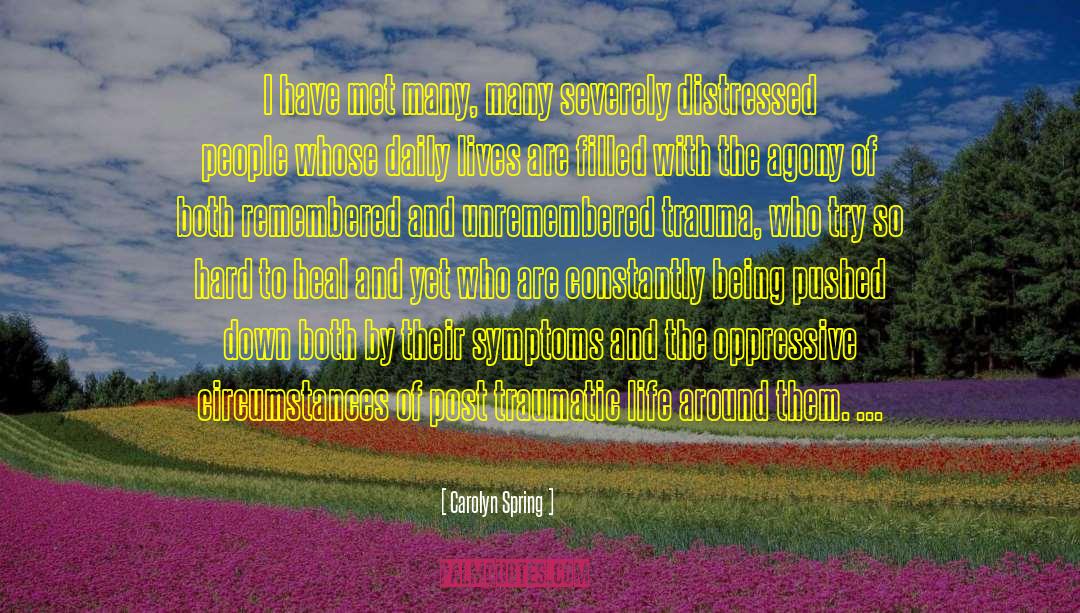
July 15, 1991
Nita: My mother was a paragon of our neighborhood, People always come up to us with hugs, saying "You have the most wonderful mother." l'd think. "Don't you see what's going on in this house?" To this day, if somehow even in jest raises their hand to me, I will do this (raises hands to protect face and cowers) I cringe. Then they look at me like, what's your probem? You don't get that from a great childhood. ~ Sarah E. Olson
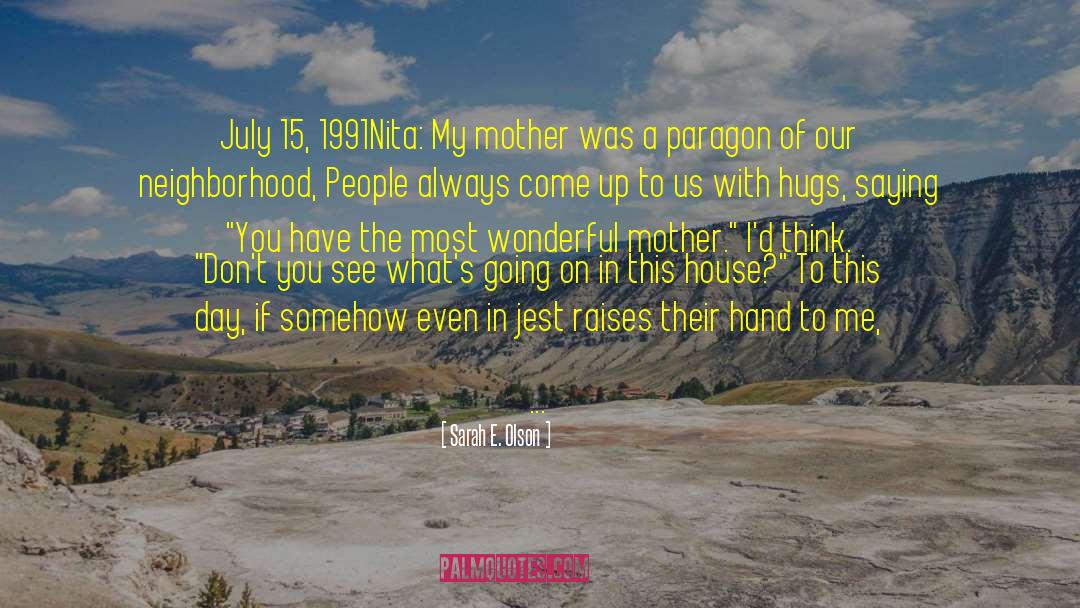
We are threatened with suffering from three directions: from our body, which is doomed to decay ... , from the external world which may rage against us with overwhelming and merciless force of destruction, and finally from our relations with other men ... This last source is perhaps more painful to use than any other. (p77) ~ Sigmund Freud
